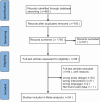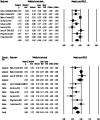The effect of game-based interventions on children and adolescents with autism spectrum disorder: A systematic review and meta-analysis
- PMID: 40256395
- PMCID: PMC12006128
- DOI: 10.3389/fped.2025.1498563
The effect of game-based interventions on children and adolescents with autism spectrum disorder: A systematic review and meta-analysis
Abstract
Purpose: The purpose of this meta-analysis was to conduct a comprehensive evaluation of randomized controlled trials (RCTs) of game-based interventions (GBI) for children and adolescents with autism spectrum disorder (ASD) to identify the clinical efficacy of GBI on core symptoms and other concomitant symptoms of ASD.
Methods: PubMed, Web of Science, Embase and the Cochrane Library were systematically searched for articles published until July 2023.
Results: Twenty-four studies with 1,801 patients met the inclusion criteria. The results showed that GBI had a significant positive effect on social skills (g = -0.59, p = 0.004), social behaviors (g = 0.45, p < 0.001), and cognition (g = 0.57, p < 0.001) in children and adolescents with ASD, while the effects of language expression (g = 0.15), anxiety (g = -0.13), and parenting stress (g = -0.51) were small and nonsignificant.
Conclusions: The results of the current meta-analysis showed that GBI was effective in improving social skills, social behaviors and cognition in children and adolescents with ASD in the existing studies and was not significant in improving language skills, anxiety and parental stress, but due to the limited number and low quality of the included studies, the above conclusions need to be validated by conducting more large-sample, high-quality RCTs.
Systematic review registration: www.crd.york.ac.uk/prospero/display_record.php?ID=CRD42023390793, identifier: CRD42023390793.
Keywords: adolescence; autism spectrum disorder; children; game-based interventions; meta-analysis.
© 2025 Gao, Song, Huang, Zhang and Ke.
Conflict of interest statement
The authors declare that the research was conducted in the absence of any commercial or financial relationships that could be construed as a potential conflict of interest.
Figures










Similar articles
-
Physical Activity Interventions for Improving Cognitive Functions in Children With Autism Spectrum Disorder: Protocol for a Network Meta-Analysis of Randomized Controlled Trials.JMIR Res Protoc. 2023 Jun 28;12:e40383. doi: 10.2196/40383. JMIR Res Protoc. 2023. PMID: 37379078 Free PMC article.
-
Efficacy and Safety of Diet Therapies in Children With Autism Spectrum Disorder: A Systematic Literature Review and Meta-Analysis.Front Neurol. 2022 Mar 14;13:844117. doi: 10.3389/fneur.2022.844117. eCollection 2022. Front Neurol. 2022. PMID: 35359629 Free PMC article.
-
Emotion recognition deficits in children and adolescents with autism spectrum disorder: a comprehensive meta-analysis of accuracy and response time.Front Child Adolesc Psychiatry. 2025 Jan 14;3:1520854. doi: 10.3389/frcha.2024.1520854. eCollection 2024. Front Child Adolesc Psychiatry. 2025. PMID: 39877703 Free PMC article.
-
The efficacy of mindfulness-based therapy for anxiety, social skills, and aggressive behaviors in children and young people with Autism Spectrum Disorder: A systematic review.Front Psychiatry. 2023 Mar 13;14:1079471. doi: 10.3389/fpsyt.2023.1079471. eCollection 2023. Front Psychiatry. 2023. PMID: 36993931 Free PMC article.
-
Optimal dose of oxytocin to improve social impairments and repetitive behaviors in autism spectrum disorders: meta-analysis and dose-response meta-analysis of randomized controlled trials.Front Psychiatry. 2025 Jan 29;15:1477076. doi: 10.3389/fpsyt.2024.1477076. eCollection 2024. Front Psychiatry. 2025. PMID: 39944132 Free PMC article.
References
Publication types
LinkOut - more resources
Full Text Sources
Miscellaneous

